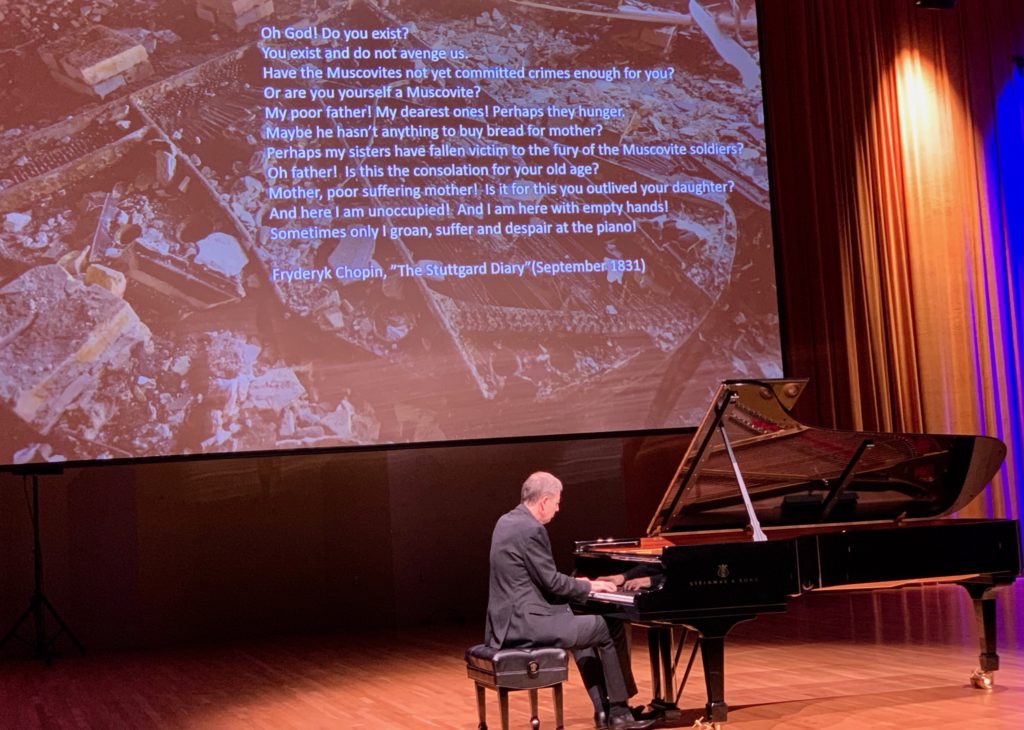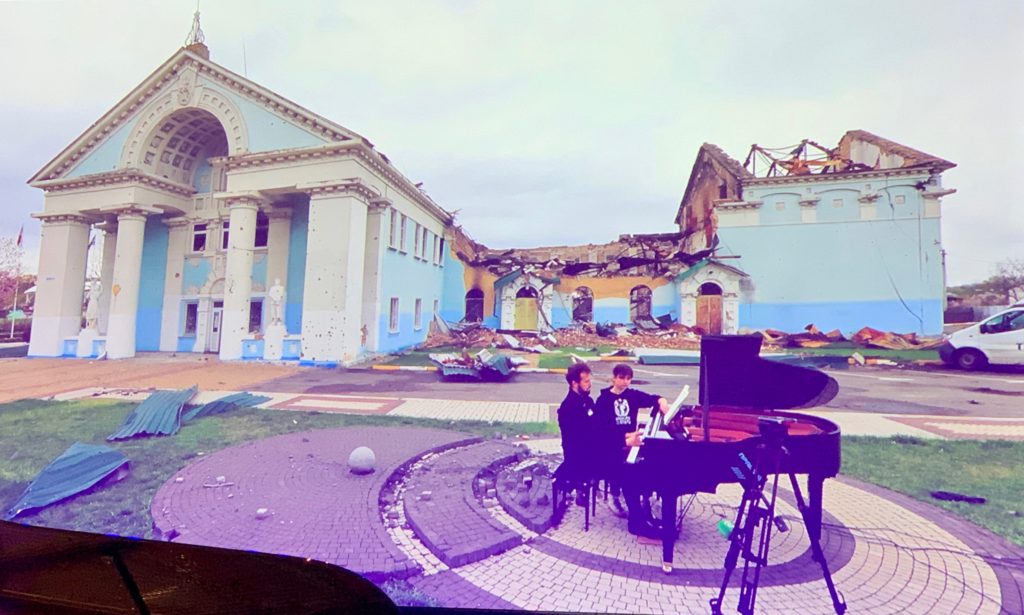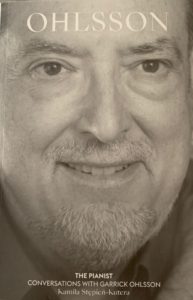Chopin for Ukraine
This week, as in 2018 and 2019, I had the great pleasure of attending the Chopin Festival at the University of Miami, just minutes from my son David’s house in Coral Gables. Days I spent with my twin granddaughters Nina and Margot, now 8-1/2; evenings I drove a short distance to hear outstanding artists play the music of Chopin, one of my favorite composers. This year admission to the Festival was free, in order to inspire donations to the Relief Fund for Ukrainian Musicians.
Kevin Kenner, Artistic Director of the Festival, proclaimed that the Festival “stands side by side with the people of Ukraine in their battle to defend their country, history, culture, literature, art, and music. We feel the urgency of supporting Ukrainian artists who are trying to survive the loss of their work, concert halls, libraries, instruments, and futures in music.” This one-minute video shows how bad it is and also how courageous Ukrainians can be.
Kenner then played Elegie-Prelude, written in 1920 by Ukrainian composer Boris Lyatoshinsky, followed by Chopin’s Polonaise in C Minor, Op. 40, No. 2. The large screen behind the piano showed a recent photo of the deplorable destruction Putin has unleashed. Superimposed was the text of a cry of despair that Chopin wrote in 1831, when he was escaping an earlier Russian aggression in Poland. How can I get Putin to read it?
Oh God! Do you exist?
You exist and do not avenge us.
Have the Muscovites not yet committed crimes enough for you?
Or are you yourself a Muscovite?
My poor father! My dearest ones! Perhaps they hunger.
Maybe he hasn’t anything to buy bread for mother?
Perhaps my sisters have fallen victim to the fury of the Muscovite soldiers?
Oh father! Is this the consolation for your old age?
Mother, poor suffering mother! Is it for this that you outlived your daughter?
And here I am unoccupied! I am here with empty hands!
Sometimes I only groan, suffer and despair at the piano!
Fryderyk Chopin, “The Stuttgart Diary” September, 1831
 Kenner’s playing communicated even more eloquently than the photo or the poem the depth of the struggles in eastern Europe that continue two centuries later. I could hear more military rhythms, harmonic heartbreaks, and melodic pathos in Chopin’s music than I’d ever realized before. The sum of the musical parts rang true. I cried. And I resolved to practice more Chopin.
Kenner’s playing communicated even more eloquently than the photo or the poem the depth of the struggles in eastern Europe that continue two centuries later. I could hear more military rhythms, harmonic heartbreaks, and melodic pathos in Chopin’s music than I’d ever realized before. The sum of the musical parts rang true. I cried. And I resolved to practice more Chopin.
Next, six students from the week-long Academy presented somewhat happier works by Chopin. Particularly impressive to me was Tomasz Kleczek, 17, who played Nocturne in C minor, Op.48 No 2, and Etude Op. 10, No. 4. He and his siblings, Antoni, 15, and Evelina, 13, whom I got to meet after their outstanding performances on Friday night, live in Vienna VA and have won several competitions sponsored by the Northern Virginia Music Teachers Association, an organization I served in many capacities for 33 years.
On Friday night Kenner introduced Khrystyna Mykhailichenko. Remember that name. She is a remarkable 16-year-old who had escaped from Crimea to Kiev in 2014, and from Kiev to Poland only months ago. Kenner has a house with a piano in Poland that he lent to her when he became aware of her need. He met her there only six weeks before the Festival began. Generous Miami benefactors financed her travel to the US so that she could participate in the Festival. She performed six very difficult works: Prelude and Fugue in C-sharp Minor BWV 873 by Bach, the first movement of Beethoven’s “Hammerklavier” Sonata, two Transcendental Etudes by Liszt, and Chopin’s Ballade in F Minor, Op. 52. Then she brought down the house with Rhapsody on Ukrainian Themes, Op. 18 by Mykola Lysenko, earning a standing ovation from a hard-to-impress audience. Wow!
 The final concert on Sunday night was another “WOW!” The screen on the stage showed clearly how resourceful Ukrainians can be. I was inspired to double the contribution to the Relief Fund for Ukrainian Musicians that I had made on Thursday. First, four students performed works by Chopin. It was brave of Athena Deng to play the same Ballade in F Minor, Op. 52 that Khrystyna Mykhailichenko had played on Friday, but Athena had her own interpretation. I doubt if she has ever faced the challenges Khrystyna has, but she put her whole heart and soul into the music. It seemed as though all the Academy students had learned a lot about “making the piano sing” (more on this below).
The final concert on Sunday night was another “WOW!” The screen on the stage showed clearly how resourceful Ukrainians can be. I was inspired to double the contribution to the Relief Fund for Ukrainian Musicians that I had made on Thursday. First, four students performed works by Chopin. It was brave of Athena Deng to play the same Ballade in F Minor, Op. 52 that Khrystyna Mykhailichenko had played on Friday, but Athena had her own interpretation. I doubt if she has ever faced the challenges Khrystyna has, but she put her whole heart and soul into the music. It seemed as though all the Academy students had learned a lot about “making the piano sing” (more on this below).
After intermission came the grande finale: Garrick Ohlsson!
Sonata in C Major, Opus 1 by Johannes Brahms
Three works by Fryderyk Chopin:
Barcarolle, Opus 60
Fantaisie in F Minor, Opus 49
Scherzo in C-sharp Minor, Opus 39
Ohlsson is about my age. I have heard him in concerts and in many recordings. In graduate school at Catholic University in Washington DC I studied in detail the Fantaisie and the Scherzo he played, identifying harmonic structures. I bought the book, The Pianist: Conversations with Garrick Ohlsson by Kamila Stepien-Kutera, on Thursday and almost finished it by Sunday evening. One of the conversations details the challenges of “making the piano sing,” a goal I have had all my life. The piano is a percussive instrument, but with carefully calibrated arm weight, judicious use of pedals, and the fine acoustics that bless Guzman Hall at the Frost School of Music, the human voice can be invoked. These Chopin Academy students had obviously been focusing on this difficult art.
Ohlsson was in peak form Sunday night. The piano sang. The audience was unusually receptive. I could feel a wonderful give and take between performer and listeners. Ohlsson responded to the appreciation vibes with a lifetime of knowledge and artistry. His playing expressed the profound experiences and ardent hopes of Chopin and the Ukrainians. I was inspired to return to certain pieces by Chopin, Brahms, and Paderewski and experiment with new interpretations. Thank you, Frost Chopin Festival, for showcasing great composers, ardent students, and magnificent mastery of piano performance.

Leave a Reply